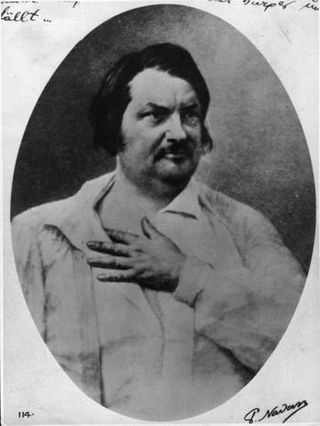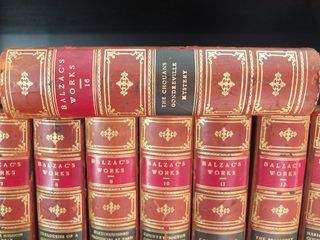Reading Balzac: Part Mystery, Part Tragedy

There's a soft spot in my literary heart for Honoré de Balzac. For one thing, he added that de to his name so he could sound more aristocratic (and got away with it). For another, he was a fiend when it came to his coffee, a sentiment I can get behind whole-heartedly. But the greatest thing about Balzac was the crazy scope of his writing project. All his novels, taken collectively, constitute La Comédie humaine, the mother of all interlinking stories, a social document in fiction which (unlike so many social documents) is actually enjoyable to read.
I have Balzac on the brain for two reasons. First, with the publication of my third Roland March novel looming, I find myself contemplating the ways in which the three books are really one long project. Not three novels each in three parts, but one novel in nine parts ... discreet episodes in a single story world.
Not that I'm comparing myself to Mr. B. The beauty of his accomplishment is that the main character in one novel becomes a minor character in the next, crossing both time and genre. The closest parallel today might be the miniseries, only you'd have to imagine a really meandering one with the patience to follow a background character through the side exit into the world in which he's a protagonist.
My second reason for mentioning Balzac is that I'm reading him again. This time I'm diving into The Gondreville Mystery, collected in a little tome entitled The Mysteries of Honore de Balzac, the tenth volume in a series called The Classics of Mystery published by Jupiter Press. This has been my midnight reading for several days now, and I'm enjoying it immensely.

The truly sad part of the story is that I have a much older, nicer copy of the book, sharing the same cover with The Chouans (above). Only I can't read it. When I rescued this complete set of Balzac from a Palo Alto bookseller four or five years ago, I thought my days of Balzac deprivation were over. As the intro to the Classics of Mystery volume notes, finding the great man in English translation isn't easy. I've tried him in French, but my grasp of la langue française isn't up to the task.
Unfortunately, these beautiful books suffer from a terrible case of leather rot (I think the conservators call this "red rot," because when you touch them, your hands come away red). I didn't realize it until too late. Frankly, I would have bought them anyway. In some far off time, I imagine having them restored or rebound. Until then, I mainly just gaze at them, dreaming of what might have been.



